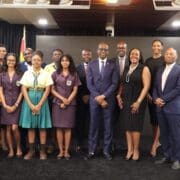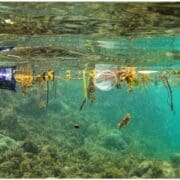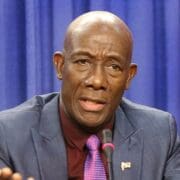Black Immigrant Daily News
By Erika Schelby
With oceans, countries, populations, and governments inundated by a plague of plastic worldwide, it may be useful to focus on the single-use plastic bag choices made by two cities, in the same U.S. state, located at a distance of only 64 miles (104 km) from each other. Both Santa Fe and Albuquerque share many qualities and conditions, foremost among them a distinctive cultural mix of American, Hispanic/Latino, and Native American citizens. But the two communities are also dissimilar, and this is reflected in the way they have dealt with the plastic bag dilemma.
Santa Fe is the oldest capital city in the United States. It is the seat of the New Mexico government and is home to the country’s third-largest art market. It calls itself “the City Different” and has more than 250 art galleries and dealers, a dozen state and private museums, and a world-class opera, for its more than 88,000 residents.
The “costly negative implications for tourism, wildlife and aesthetics” led Santa Fe to ban single-use plastic carryout bags with Ordinance No. 2015-12 in April of 2015. The decision was also made “to protect the environment while reducing waste, litter, and pollution in order to help improve the public’s health and welfare.” In April 2016, an open letter was sent from the mayor and addressed to the local businesses explaining the project and the new rules in detail.
Nearby Albuquerque is also attractive but less rarefied and more of a workhorse city. It is much larger with a population of 562,599 as of 2021, a growth rate of 24.8 percent since 2000, and a metropolitan area population of 942,000 until 2022. It has a total of 49.8 percent Hispanic inhabitants. Most have lived here for generations. Located in the high desert along the Rio Grande, Albuquerque has several museums, an Old Town dating back to 1706, and various cultural and recreational attractions.
After long debates, Albuquerque’s Clean and Green Retail Ordinance became effective on January 1, 2020. Single-use plastic bags were banned from the point of sale. But then came the pandemic, and enforcement was deferred. Doing business at the retail level had already grown difficult and stressful for management, employees, and shoppers. Supply chains were disrupted. With the new challenges thrown up during the pandemic, these changes seemed all too much at once. The city council listened to the plight of constituents and decided to oppose Mayor Tim Keller’s progressive plastic bag ban. It voted 6-3 to revoke it. The mayor bravely vetoed the reversal. Yet on April 4, 2022, the councilors’ motion to override the veto passed with a vote of 6-3 once again. The ban on single-use plastic bags was lifted. Convenience won the battle against environmental concerns but did not win the war.
That struggle is undeniably bigger than one city council’s decision to put off what needs to be done. In 2007, San Francisco became the first U.S. city to pass a law against the use of single-use plastic bags. California followed by implementing a statewide ban in 2014. Puerto Rico and 10 states have enacted legislation to ban single-use plastic bags: California, Connecticut, Delaware, Hawaii, Maine, New Jersey, New York, Oregon, Vermont, and Washington. And in contrast to Albuquerque’s reversal of the ban, a growing number of American cities have introduced plastic bag bans or bans and fees–among them are Boston, Chicago, Los Angeles, Seattle, Boulder, New York, Portland, Washington, D.C., and San Francisco. Internationally, a growing number of countries have launched nationwide bans on producing, using, and distributing plastic bags.
Experiencing devastating floods in the summer of 1998, Bangladesh noted that thin plastic bags were clogging hundreds of storm drains and drainage systems during flooding, worsening the situation. This caused an estimated 80 percent of the flooding blockages in cities. So in 2002, Bangladesh implemented a ban on all plastic shopping bags in the nation, becoming the first country in the world to do so. Others followed. “According to a United Nations paper and several media reports, 77 countries in the world have passed some sort of full or partial ban on plastic bags,” reported Statista.
Unfortunately, such prohibitions are not enough. Despite the fact that Bangladesh became the world’s first country to ban plastic bags, their use continued to cause environmental harm. Its Department of Environment confiscated 592,223 metric tons of polythene from 2019 to 2021. The number of illegal polybag manufacturers increased from 300 in 1999 to an estimated 700 to 1,000 by 2021. In addition, until 2019, about 1.2 million metric tons of plastic waste was shipped in from the U.S. and the UK, making a bad situation worse.
Instead of finding solutions to the issues related to plastic pollution, reports by Western nonprofits and companies have, meanwhile, helped push the blame for polluting the world’s oceans onto “a small geographical area in East and Southeast Asia.” In July of 2022, the well-known nonprofit advocacy organization Ocean Conservancy delivered an official apology for the damage done by a report it coauthored along with McKinsey Center for Business and Environment in 2015: Stemming the Tide: Land-Based Strategies for a Plastic-Free Ocean.
Impeccably written, professional in tone, and convincing in language, the report claimed research had shown that more than half of the plastic pollution entering the ocean originated from five Asian countries: China, the Philippines, Indonesia, Vietnam, and Thailand. The report claimed that “increasing economic power” and “exploding demand for consumer products” had led these countries to produce and use plastic heavily, and they lacked the infrastructure to deal with the resulting plastic waste tsunami. Consequently, the waste ended up in the ocean. The study argued that the most effective way to deal with this was through recycling. What was meant by this euphemistic term was the deployment of waste-to-energy technology: gasification, and incineration.
Yet burning plastic discharges a potent and dangerous mix of toxins and greenhouse gases into the atmosphere and into the communities unfortunate enough to be near the incinerating sites. Moreover, for a number of rich countries with environmental restrictions, the cynical hype for recycling has fostered the export of plastic trash to less developed countries like Bangladesh, resulting in the charge of “waste colonialism.” Additionally, the report created an injurious and false narrative. Although it was removed from the Ocean Conservancy website, it lingers on as a sophisticated and warning masterpiece of greenwashing. It is surprising that it took so long to acknowledge this truth, given the list of the project’s supporters: the Coca-Cola Company, the Dow Chemical Company, the American Chemistry Council, and the Recycling and Economic Development Initiative of South Africa, among others.
Meanwhile, with a March 2022 UN resolution adopted during the United Nations Environment Assembly 5.2 in Nairobi to end plastic pollution, governments have started to strive for a global, legally binding agreement by 2024. It could not be like another timid 2015 Paris Agreement. It needed teeth. So from November 28 to December 2, 2022, delegates from 150 countries met for the UN’s first session of the Intergovernmental Negotiating Committee (INC1) in Punta del Este, Uruguay, to begin negotiations that will eventually lead to an international plastics treaty. Or so one hopes. “Turn off the tap on plastic,” said UN Secretary-General Ant?nio Guterres. “Plastics are fossil fuels in another form.”
Indeed, that’s what they are: products made from oil and gas. Americans discard 100 billion bags annually, which are manufactured from 12 million barrels of oil. And what makes these flimsy thin, light, cheap, containers especially dreadful is perhaps the fact that globally 500 billion of them are used annually, for an average of only 15 minutes. After that brief moment in time, they are thrown away. Yet they go on polluting the environment and causing health hazards for years.
What is more, most of the 8.3 billion metric tons of plastic that have been manufactured since the 1950s remain in landfills or within the natural environment. By 2050, it is estimated that around 12 billion metric tons of plastic waste will reside in landfills or the natural environment. Plastic is a synthetic substance. It does not biodegrade. Eventually and very slowly the sun, wind, water, waves, and abrasion break it down into tiny particles. Single-use polyethylene plastic bags will take up to 1,000 years to photo-degrade. Effective recycling, specifically in the U.S., may be a pipe dream. The practical infrastructures, facilities, workers, and readiness to handle this daily flash flood of indestructible waste do not exist and would be expensive to achieve. Incineration is not a solution: it does more harm than good. Therefore it is no big surprise that globally, more than 90 percent of plastic is not recycled. The pile ends up in landfills, rivers, and oceans.
Much of the plastic waste is dumped in landfills. As it breaks down, it leaches hazardous chemicals, contaminates the surroundings, and infiltrates the food chain. According to a fact sheet from EarthDay.org, “Researchers in Germany indicate that terrestrial microplastic pollution is much higher than marine microplastic pollution–estimated at four to 23 times higher, depending on the environment.”
Nevertheless, tossing plastic garbage into the oceans proceeds at a furious pace. A lot of it is swept in from rivers. At least 10 million tons of plastic waste ends up in our oceans each year. If this continues, we may have more plastic than fish in the oceans by 2050.
Globally, people generate so much filth and debris that these waste products are now beginning to accumulate and occupy significant space, sometimes larger than the size of whole cities and countries. One such example is the Great Pacific Garbage Patch (GPGP), which “is a collection of marine debris” spanning “waters from the West Coast of North America to Japan.” It is already enormous–estimated to be some 1.6 million square kilometers, about twice the size of Texas or three times the size of France–and may spawn a whole family of floating trash concentrations that drift and travel with ocean currents and thereby can reach additional bodies of water. The relentless energy of the sea grinds portions of these garbage vortexes into microplastics. This produces a thick, cloudy gumbo in which larger items are suspended. A share of this mess sinks down to the seafloor. As a result of this, algae and plankton are deprived of sunlight and wiped out, which leads to fish and turtles growing hungry and weak. Many perish. This causes less food for tuna, sharks, and whales, leading to the marine food web being destabilized.
Humans already eat–literally–five grams of microplastics and nanoplastics, or a credit card’s worth of plastic, every week. That amounts to between 39,000 and 52,000 particles of plastic added to our diet every year. Microplastics can be found in animals, fish, and birds, and also in human blood and organs. They even invade the placentas of unborn babies. They are everywhere.
Plastic is affecting human health and reproduction and might have irreparable consequences for the human species, even leading to “human extinction” if uncontrolled use of plastics is not prevented. In mice, research has already shown a decrease in the quantity and quality of sperm and a reduction of total follicles in the ovaries of females. So far, investigations into the effects of microplastics absorbed into the human body have barely begun. Science needs another 10 to 15 years to come up with answers.
The wish for a clean, safe personal space–a home–is hardwired into humans. Indeed, many individuals want to make their homes as beautiful as possible according to their means and their taste. But each person also generates waste and is responsible for it–that’s the flip side of our way of life. In contemporary households, the waste is flushed away or picked up in a trash bin by the waste management services of a city. Residents pay fees for this convenience. But the waste is still theirs. It has simply been relocated–it’s out of sight, out of mind.
That is where the problem lies. Municipalities and landfills are overwhelmed with plastic waste. In 1960, the U.S. generated 88.1 million tons of solid waste; by 2018, this had increased to a whopping 292.4 million tons. America had become a wasteful society that throws stuff away. In 2022, it became the second largest per capita generator of solid municipal waste in the world–surprisingly after Denmark, which is often cited as a model global citizen. Other highly developed countries produce far less waste than the U.S. A special case is Australia’s city of Adelaide, which may have the most effective waste program anywhere. A recent article in the Guardian tells the story of Alice Clanachan, a woman who applied the city’s “reduce, reuse, recycle” plan so resolutely, that for a total of 26 months, she didn’t need to put her rubbish bin out for collection.
Here in the United States, in the state of New Mexico, the city of Santa Fe succeeded in banning single-use plastic bags years ago. Its residents understood that you cannot maintain a beautiful home for long without caring for the surroundings. If individuals loathe the idea of befouling their own interior spaces, they can also leap to the wider view of detesting the squalor inflicted on the entire planet–our common home. Perhaps this was easier to do in Santa Fe. It’s a small place that knows its own mind.
For Albuquerque, the American can-do attitude may reassert itself sometime soon. Civic pride and civic duty will remind the residents that the ban on single-use bags is a rare thing they can control and do right here and now, at the local level. People have done just that before the plastic plague began. And we can even do our shopping by adopting the uncomplicated routine of bringing our own durable and reusable bags. This simple step could help decrease plastic waste and help promote a cleaner way of living and supporting all life on Earth.
Donate At Caribbean News Service, we do not charge for our content and we want to keep it that way. We are seeking support from individuals and organisations so we can continue our work & develop CNS further.
NewsAmericasNow.com











